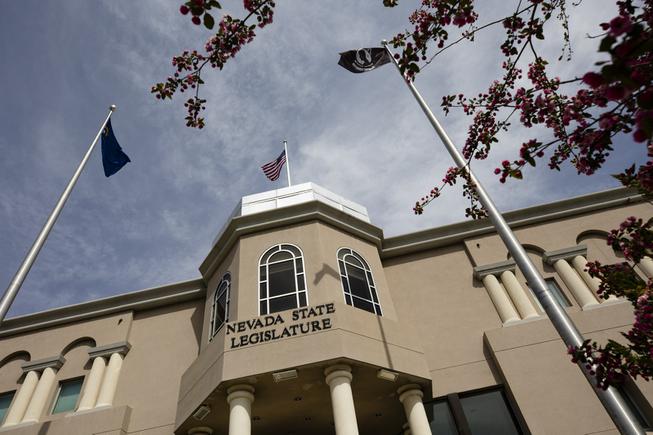Sunday, April 2, 2023 | 2 a.m.
Nevada legislators seem keen on greening schools through state-funded campus gardens.
The Senate Finance Committee discussed Senate Bill 244 on Tuesday, and though they didn’t commit to setting aside the $3 million the bill seeks over the next two years for gardens at elementary schools statewide, lawmakers were supportive.
“It’s always been important to me to make sure kids know that their food doesn't just come in a cellophane wrapper from the grocery store,” said Sen. Robin Titus, R-Wellington.
The bipartisan bill would have the Department of Education dole out money to nonprofit organizations that would partner with schools to create and maintain gardens, allow students to hold their own farmers markets and learn how their crops can be used to make a meal. At least 80% of the funds would go to low-income schools.
Ciara Byrne, CEO of Green Our Planet, a Vegas-based educational nonprofit that uses gardening as a springboard, placed its first school garden in 2013. They are now partnered with more than 200 schools in Clark County and about 260 statewide.
Green Our Planet provides a curriculum, including entrepreneurship lessons that introduce fifth-graders to business plans, profit and loss sheets and marketing strategies. Twice a year, the organization helps the schools host farmers markets that they bill as the largest student-run markets in the country. The next ones are April 21 in Downtown Summerlin and outside the capitol in Carson City.
“We use gardens as a portal for understanding life on earth and our place in the universe. Our mission is to empower the next generation of scientists, farmers, conservationists, entrepreneurs, engineers and chefs,” Byrne said.
Sen. Julie Pazina, the bill’s lead sponsor, said the $3 million allotment would continue the momentum established by a 2017 bill that gave $615,000 for school gardens.
“School garden programs are powerful learning tools for science, technology, engineering, arts and math,” and also good for life skills, behavior, sense of community and healthy eating choices, said Pazina, D-Las Vegas.
Sen. Marilyn Dondero Loop, D-Las Vegas, said it’s clear that students understand and enjoy the material.
“When you see that the kids really get it, they really are interested in what they're doing, it’s rewarding for us as adults watching them, but it's rewarding for them” too, she said.
New legislation
A few of the education-related bills that were introduced last week include:
AB423: This bill prohibits school boards from taking any action at a meeting that lasts past midnight and allows boards to restrict public comment if the speaker is being irrelevant or disruptive. The bill, brought by the Assembly Committee on Government Affairs, appears to be taking aim at school board meetings that can last for hours.
If the board has not taken action on any item on its agenda before 11:59 p.m., it must postpone the item until at least 8 a.m. the following day, the bill states. As for comment restrictions, the bill allows school boards to limit comments on topics that are not relevant to or within the authority of the board, or if the speaker “is willfully disruptive of the meeting by being slanderous or offensive.”
SB394: This bill increases property taxes by 10 cents per $100 of a property’s assessed value for the benefit of public schools. The bill, brought by the Senate Committee on Revenue and Economic Development, increases the portion of a property’s taxes for schools from 75 cents on each $100 of assessed valuation to 85 cents, and sets the total amount of property tax that may be imposed from $3.64 per $100 to $3.74 per $100.
SB425: This bill establishes the “Commission on Innovation and Excellence in Education” to study high-performing education systems around the country and world to see how Nevada can replicate their successes. The 24-member commission would consist of legislators, the Superintendent of Public Instruction, the director of the state’s office of finance, the chancellor of the Nevada System of Higher Education, educators, and appointees from education, governmental and business organizations.

